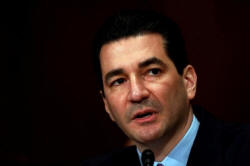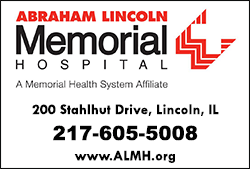|
 FDA's
Gottlieb blames industry 'Kabuki drug pricing' for high
costs FDA's
Gottlieb blames industry 'Kabuki drug pricing' for high
costs
 Send a link to a friend
Send a link to a friend
[March 08, 2018] By
Yasmeen Abutaleb
WASHINGTON (Reuters) - U.S. Food and Drug
Administration chief, Scott Gottlieb, criticized pharmacy benefit
managers, health insurers and drugmakers on Wednesday for "Kabuki
drug-pricing constructs" that profit the industry at the expense of
consumers.
|
|
 The comments, made at a conference organized by a leading U.S.
health insurer lobbying group, stoked speculation over what steps
the administration of U.S. President Donald Trump may take to rein
in lofty prescription drug costs. The comments, made at a conference organized by a leading U.S.
health insurer lobbying group, stoked speculation over what steps
the administration of U.S. President Donald Trump may take to rein
in lofty prescription drug costs.
"Patients shouldn't face exorbitant out-of-pocket costs, and pay
money where the primary purpose is to help subsidize rebates paid to
a long list of supply chain intermediaries," Gottlieb said at the
meeting of America's Health Insurance Plans (AHIP). "Sick people
aren't supposed to be subsidizing the healthy."
The remarks surprised meeting participants and spurred new
accusations between leading members of the drug supply chain. Shares
of top pharmacy benefits managers CVS Health Corp and Express
Scripts Holding Co fell 1.4 percent and 2.4 percent, respectively.

He criticized the health industry for failing to promote access to
so-called biosimilar versions of drugs, and for pricing practices
that harm consumers.
Biosimilars are copies of original drugs that are supposed to be as
effective but cheaper. Kabuki is a form of Japanese theater
characterized by dramatization and elaborate costumes.
Gottlieb said practices in the healthcare industry "obscure profit
taking across the supply chain that drives up costs" and discourage
competition.
As FDA commissioner, Gottlieb has prioritized approving more generic
drugs to help lower prices, allowing more than 1,000 copycat drugs
into the market last year, he said.

[to top of second column] |

Still, while the agency has approved nine biosimilar therapies to
date, only three have reached the market, Gottlieb said. The rest
have been mired in legal challenges brought by drugmakers such as
AbbVie Inc to protect its multibillion-dollar rheumatoid arthritis
treatment Humira.
Trump has vowed repeatedly that his administration will take more
steps to lower drug costs, and included some potential actions in a
proposed budget made public last month that Congress is not likely
to accept.
Other regulatory actions could come directly from Health and Human
Services Secretary Alex Azar, a former drug company executive, and
through the department's Centers for Medicare and Medicaid Services.
Azar is scheduled to deliver remarks at the AHIP conference on
Thursday.

Gottlieb noted that the top three pharmacy benefit managers - CVS,
UnitedHealth Group Inc and Express Scripts - control more than
two-thirds of their market. The top three wholesalers -
AmerisourceBergen Corp, Cardinal Health Inc and McKesson Corp -
control more than 80 percent; and the top five pharmacies more than
50 percent, he said.
AHIP responded by saying drug manufacturers were to blame for the
high cost of prescription medicines. The Pharmaceutical Care
Management Association, which represents pharmacy benefit managers,
also said it was unfair to place blame on payers who cannot control
the prices drugmakers set.
(Editing by Bernadette Baum)
[© 2018 Thomson Reuters. All rights
reserved.] Copyright 2018 Reuters. All rights reserved. This material may not be published,
broadcast, rewritten or redistributed.
Thompson Reuters is solely responsible for this content. |